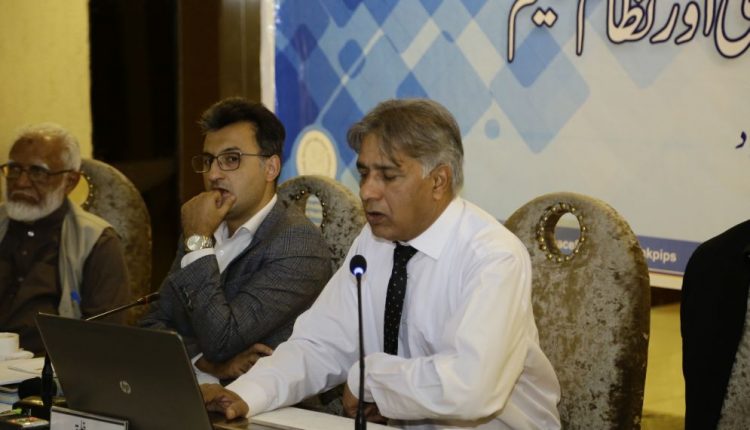Teachers can foster social harmony by dialogue: PIPS teacher dialogue
On 29 and 30 October 2018, PIPS convened dialogue on social harmony, with public colleges’ teachers from northern Punjab. Spanning for eight sessions, it was led by learned scholars and analysts.
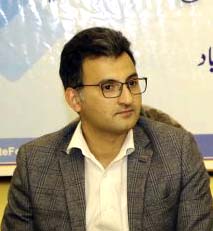 PIPS’s senior project manager Muhammad Ismail Khan shared the dialogue is held to foster two-way interaction in society. Teachers can uphold diversity in the classroom, by exercising dialogue-enhancing skills.
PIPS’s senior project manager Muhammad Ismail Khan shared the dialogue is held to foster two-way interaction in society. Teachers can uphold diversity in the classroom, by exercising dialogue-enhancing skills.
Meanwhile, PIPS’s director Muhammad Amir Rana, in an interaction with the participants, shared  while social harmony is greatly valued in any society, increasingly, a country’s progress is measured on indicators directly linked to social cohesion.
while social harmony is greatly valued in any society, increasingly, a country’s progress is measured on indicators directly linked to social cohesion.
Dr. Khalid Masud, Former Chairman of the Council of Islamic Ideology (CII), wondered why despite numerous efforts, both by state and society, to condemn and counter extremism, we are often back to square one. This, he owed, to exaggerated, out-of-context 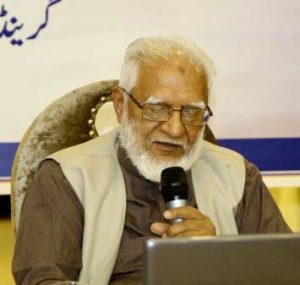 interpretation of religion. Such explanations, although politically-motivated, have now sunk in the minds of the people, who often find mismatch between words and feelings, when it comes to ridding extremist worldviews.
interpretation of religion. Such explanations, although politically-motivated, have now sunk in the minds of the people, who often find mismatch between words and feelings, when it comes to ridding extremist worldviews.
As a result, many in Pakistani society do not understand how to co-exist and live in harmony with people different from them. In fact, he said,difference is rejected as inherently detrimental to the social fibre. This, he said, is wrong and suggested that the way out for Pakistan is to embrace pluralism.
Dr. Masud also stressed we are living in changing times: the world is co-inhabited by a multitude of people, believing in different faiths, following different rituals. It is therefore incumbent that such diversity be appreciated and accepted.
Harris Khalique, poet and political analyst, said the problems Pakistan face vis-à-vis extremism have three 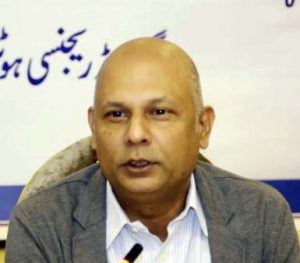 sources: One, there are problems unique to Pakistan, much like any other country will have its own problems to deal with. Two, some problems are those faced by the current Muslim world. But the gravest problems, he said, are those that it has inherited as a post-colonial society. Interplay of these three sets of problems manifests themselves in the shape of extremism, and our inability to overcome them.
sources: One, there are problems unique to Pakistan, much like any other country will have its own problems to deal with. Two, some problems are those faced by the current Muslim world. But the gravest problems, he said, are those that it has inherited as a post-colonial society. Interplay of these three sets of problems manifests themselves in the shape of extremism, and our inability to overcome them.
Speaking of media, he said Pakistani media is quite diverse. One such variation is across language: While Urdu media, he said, tilts towards conservative views, the English press is more progressive. Yet, the total circulation of all English papers across the country is less than the circulation of leading newspaper in any populous district. Similarly, the type of media matters too: Generally, the written word is more cautious and therefore less likely to incite hatred or division. This is more difficult with the electronic channels, which are in the race to break news first.
 Peter Jacob, executive director of Lahore-based Social Centre for Justice, summarized a range of problems faced by religious minorities in the country. A dilemma with minorities, he lamented, is that discrimination against minorities is so institutionalized. Discriminatory laws have been internalized by the society too.
Peter Jacob, executive director of Lahore-based Social Centre for Justice, summarized a range of problems faced by religious minorities in the country. A dilemma with minorities, he lamented, is that discrimination against minorities is so institutionalized. Discriminatory laws have been internalized by the society too.
At times, he said, even majority community behaves like minority; as a result, whenever there is any talk of advancing the rights of minorities, some in the majority reflexively narrated their own grievances. This context often hampers attempt to integrating non-Muslims in the society at large.
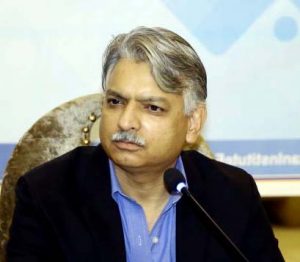 Khursheed Nadeem, columnist and TV anchor, informed the teachers about the state-endorsed Paigham-e-Pakistan document: Endorsed by leading Islamic scholar of the country, the document condemns violence in the name of religion and relays a peace narrative grounded in religion. Given that current violent extremism is often linked to certain religious interpretation, the idea behind this document was to come up with a consensus document having backing of religious scholars.
Khursheed Nadeem, columnist and TV anchor, informed the teachers about the state-endorsed Paigham-e-Pakistan document: Endorsed by leading Islamic scholar of the country, the document condemns violence in the name of religion and relays a peace narrative grounded in religion. Given that current violent extremism is often linked to certain religious interpretation, the idea behind this document was to come up with a consensus document having backing of religious scholars.
Now that the document is released, he said, it was the duty of the teachers to analyze it and and circulate it among the students. Khursheed Nadeem also narrative a brief journey of the country from its birth to the drafting of its Constitution all the way to Paigham-e-Pakistan.
 Ammar Khan Nasir said while huge expectations are attached with the position of a teacher, the teacher is often not equipped by the tools by the state to meet those expectations. Instead of talking about social harmony, teachers are restricted to finishing a predefined syllabus within the stipulated time so that students can fare well in the examination. But he added that teachers and the academic cadre are often influenced by the discourse on media, whereas they should be knowledge-producer.
Ammar Khan Nasir said while huge expectations are attached with the position of a teacher, the teacher is often not equipped by the tools by the state to meet those expectations. Instead of talking about social harmony, teachers are restricted to finishing a predefined syllabus within the stipulated time so that students can fare well in the examination. But he added that teachers and the academic cadre are often influenced by the discourse on media, whereas they should be knowledge-producer.
At the same time, the society too has come under pressure to mould its structure along the predominant western civilization of the world. The fact, however, is that it took a due process of hundreds of years for the western society to reach where it is in this age. Pakistan is being denied that margin of time and process, and is expected to radically reshape itself, he said.
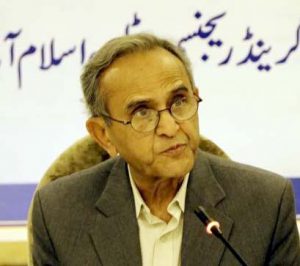 Educationist A. H. Nayyer said all over the world the discipline of social studies, comprising of history, geography, governance, civic relations, among others, is taught to inculcate national awareness. In Pakistan, the discipline has been used as a tool of mental conditioning to develop certain personality traits in students. This unfortunately has been happening for the past four decades. He said the onus of teaching social
Educationist A. H. Nayyer said all over the world the discipline of social studies, comprising of history, geography, governance, civic relations, among others, is taught to inculcate national awareness. In Pakistan, the discipline has been used as a tool of mental conditioning to develop certain personality traits in students. This unfortunately has been happening for the past four decades. He said the onus of teaching social  studies in an impartial manner lie on the teachers, notwithstanding their own limitations.
studies in an impartial manner lie on the teachers, notwithstanding their own limitations.
Dr. Raghib Naeemi, religious scholar, said the statement that “teachers can serve as role models for students” can only come to fruition if teachers consciously strive to be so. He said teachers should approach students as if one’s own children. Only then can they realize what is good for the students and what is bad for them.
Media Coverage:
Gallery:




























